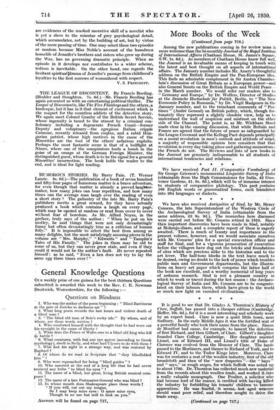More Books of the Week
(Continued from page 708.)
Among the new publications coming in for review none is more welcome than the bi-monthly Journal of the Royal Institute of International Affairs (Chatham House, St. James's Square, S.W. ls. 6d.). As members of Chatham House know full well, the Journal is an invaluable means of keeping in touch with the latest and best thought on all aspects of international affairs. The January number includes Mr. Amery's thoughtful address on the British Empire and the Pan-European idea. This finds an admirable complement in Sir Austen Chamber- lain's discussion of Great Britain as a European power—and also General Smuts on the British Empire and World Peace— in the March number. We would refer our readers also to " Germany and Europe," by Dr. Wolfers, Director of Studies at the Deutsche Hochschule fitr Politik, Berlin, to " The New Economic Policy in Rumania," by Dr. Virgil Madgearu in-the January number, and to the trenchant comments of " Per- tinax ' (Andre Geraud) on British policy, which, though for- tunately they represent a slightly obsolete view, help us to understand the wall of suspicion and mistrust on the other side of the Channel. The point is, as Mr. Wickham Steed made clear in the ensuing discussion, that while Britain and France are agreed that the future of peace as safeguarded by the League Covenant and the Kellogg Pact depends principally on a moral revolution in men's outlook and attitude of mind, a majority of responsible opinion here considers that that revolution is every day taking place and gathering momentum ; the French do not. The Reviews and lists of new books in the Journal are genuinely indispensable to all students of international tendencies and" relations.




































 Previous page
Previous page